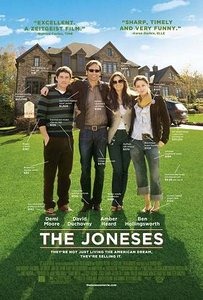 The Joneses (2009) – on rental. Several years ago I watched a film titled The Stepford Wives, starring Nicole Kidman and Matthew Broderick, which itself was a remake of a 1975 film of the same name. The film was a black-comedy of sorts and set in a quiet but swanky suburban American town. When I watched The Joneses – a film starring David ‘Fox Mulder LOL’ Duchovny and Demi Willis, whoops, Moore – I was reminded how similar in visual style was this film to the The Stepford Wives.
The Joneses (2009) – on rental. Several years ago I watched a film titled The Stepford Wives, starring Nicole Kidman and Matthew Broderick, which itself was a remake of a 1975 film of the same name. The film was a black-comedy of sorts and set in a quiet but swanky suburban American town. When I watched The Joneses – a film starring David ‘Fox Mulder LOL’ Duchovny and Demi Willis, whoops, Moore – I was reminded how similar in visual style was this film to the The Stepford Wives.
While the specific stories and outcomes for both films are quite different, they’re still thematically similar: a family moves into a quiet and swanky suburban American town where everything seems just perfect. But beneath that veneer of perfection lies hidden agendas and secret motives. So, yes; both films are essentially Desperate Housewives compressed into a 2 hours feature film.
Duchovny and Moore play Steve and Kate Jones, and they’ve just moved in with their two teenager children Jenn and Mick. Their new residence is a very upmarket, beautifully done up home. They’re friendly, suave, and also very loaded with all sorts of newest products that they use, and when opportunity arises, agree to show and demonstrate them to their new neighbors. It doesn’t take long into the film though before it’s revealed that the Jones family isn’t really a family. Rather, they’re professional salesmen and women pretending to be a family in what is the ultimate undercover marketing gimmick – insertion into a posh suburban town specifically to sell upmarket products. Some of their neighbors become envious, and coupled with a growing unease about the ethics of what they are doing, tragedy eventually strikes.

If nothing else, The Joneses to be a social commentary on modern consumerism. When I watched the film, I was reflecting on our own practices – in Singapore – of myself and those around me when it comes to buying new toys; whether it’s a car, a watch, an electronic gadget, a cosmetic product, a smartphone; all devices that are covered in the course of the film. I was reflecting on how much some of us fall into the trap of item envy, and too often blurring the lines between what’s desirable over what’s necessary. Granted, we want to live life to the fullest, and we should enjoy the fruits of our labor. But when do we ourselves become victims of our relentless pursuits to consume?
[Minor spoilers]
Ironically, while the consumerist theme comes out of the film pretty strongly, it’s actual implementation is somewhat meandering. There are a couple of subplots that dilute the film’s direction; one of which is the sexual orientation of Mick Jones – maybe that was included into the film to appeal to those of us who need to see equal gender preference representation in media – and the other is a subplot that comes and goes quickly and is left unresolved; specifically Jenn’s incestuous lust for Steve. Yep, a father-daughter sex of thing, even if in the story’s context, neither are related in reality.
On the upside; Duchovny and Moore enjoy great chemistry as sales colleagues in their first paired ‘pretend’ relationship. At the film’s start, they keep their relationship entirely professional, and that progression towards something deeper is nicely paced and believably done through story developments throughout the film.
In all, it’s watchable if only for its underlining message – if a potential social reawakening is your thing for the evening – and for the two leads. Could had been better though.





Recent comments